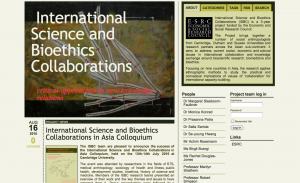The International Science and Bioethics Collaborations project was established in 2007 as a 3 year Economic and Social Research Council project to explore the relationships and transactions that make up contemporary biomedical research and bioethics in international settings. It brought together anthropologists from the universities of Cambridge, Durham and Sussex in the UK. I was a PhD student attached to the project through Durham University (more here).
The project aimed to address current social, economic and cultural issues in international collaboration and knowledge exchange around bioscientific research, biomedicine and bioethics. The researchers undertook ethnographic studies in nine countries in Asia, studying the practical and conceptual implications of values of ‘collaboration’ for international capacity-building.
Within the ISBC project there were three sub projects
(i) sponsor-host relations in international clinical trials (Cambridge; Durham)
(ii) human embryonic stem cell research in society (Sussex)
(iii) collaborative bioethics activism, advocacy and networking (Cambridge)
which aimed to contribute a culturally reflexive understanding of the drivers of commercial and academic research institutions, and forms of regulation by state and non-governmental organisations. Project members asked, when discourses of development are reframed or replaced by those of collaboration, what kinds of socio-economic demands emerge and how are these formulated in the management of science across cultures?
In July 2010, the project held an invited workshop on the methodological issues of collaboration and a collection of project outputs are available from the UK’s Economic and Social Research Council here.
